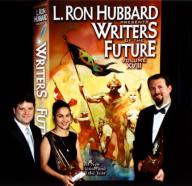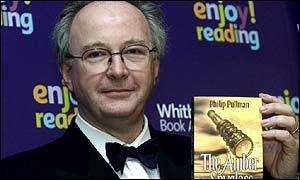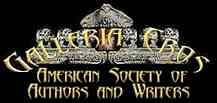New Writers Garner Awards
Aspiring writers and illustrators of speculative fiction
honored at annual ceremony

Actor Sean Astin (left)
presented the grand prizes to winners of the L. Ron Hubbard Writers
and Illustrators of the Future Contests at the awards ceremony in
Hollywood. Honored are Dylan Otto Krider, Houston, Texas (best
short story) and Irena Yankova Dimitrova, Bulgaria (best
illustration).(PRNewsFoto) |
HOLLYWOOD, Calif. -- A group of top-selling authors combined with
Lord of the Rings co-star Sean Astin (hobbit Samwise 'Sam' Gamgee)
to head up the festivities at the 18th annual L. Ron Hubbard Awards
for Achievement held the weekend of Aug. 23 - 25 in Hollywood.
Recipients of the internationally acclaimed "Writers and Illustrators
of the Future Contests" for new and aspiring writers and illustrators
of speculative fiction-- from throughout the United States, Canada and
countries ranging from England to Bulgaria and Australia--were
honored.
Astin told the winners of the Writers and Illustrators of the
Future Contests that his goal is to make visually exciting films and
he encouraged them to take responsibility for everything they create
down to the details in the stories they write and illustrate.
The actor reminded the audience that the film industry depends on
talented new writers and artists to provide the fresh ideas that will
shape the movies of tomorrow. He joked that the fourteen months
of filming he spent in big, furry hobbit feet--often in freezing cold,
wet weather--were the result of a writer's vision that probably took
only seconds to conceive!
|
|
The Writers and Illustrators of the Future Contests--the leading merit
competitions for new writers and illustrators--were themselves honored
during the ceremonies by "Starlog," the largest circulation science
fiction and fantasy magazine. "The Starlog Award," a crystal
star-shaped trophy, was presented to Author Services, Inc.,
administrators of the Contests, by Starlog magazine group president
and founder, Mr. Norm Jacobs. L. Ron Hubbard initiated the
writers competition in 1983. The Contest for new illustrators
was launched several years later.
Among the personalities attending this year's ceremony were
best-selling authors and contest judges Jerry Pournelle (Lucifer's
Hammer), Tim Powers (Declare), Kevin J. Anderson (Dune:
House Atreides), Frederik Pohl (Gateway) and Hal Clement (Needle),
as well as Dr. Doug Beason (Ignition), a Deputy Associate
Director at the Los Alamos National Research Laboratory; and
physicist-author-educator Robert Jastrow, director of the Mt. Wilson
Observatory.
Twenty-seven contest winners--17 writers and 10
illustrators--received awards during the event at the L. Ron Hubbard
Gallery in Hollywood with cash prizes totaling $23,000.
Concluding the ceremonies: the presentation of the Hubbard Gold Award
grand prizes to the top winners in each contest. Receiving the
grand prize for "Story of the Year" was Dylan Otto Krider of Houston,
Texas. The "Illustrator of the Year" prize went to Irena Yankova
Dimitrova of Bulgaria.
The event was also highlighted by the release of L. Ron Hubbard
Presents Writers of the Future, Volume XVIII (Galaxy Press), the
yearly original anthology of never before published winning stories
and accompanying illustrations. For more information on the
Contest, visit
http://www.writersofthefuture.com.
|
Murdered, She Wrote
Agatha Christie she ain't, but this
first-novel author
has a story to tell and a unique way of presenting it
|
My name was salmon, like the fish: first name, Susie. I was
fourteen when I was murdered on December 6, 1973.
Nearly everything that makes The Lovely Bones the
breakout fiction debut of the year--the sweetness, the humor, the
kicky rhythm, the deadpan suburban gothic--is there in those first
two sentences.
Part coming-of-age tale, part mystery, part ghost story, the book
was written by Alice Sebold, her first novel (she's also the
author of a memoir, Lucky). It's the tale of an
ordinary girl who is raped, murdered, and dismembered in a field
near her house. Three days later, a neighbor's dog comes
trotting home with her elbow in its mouth. This is horror at
its darkest and most tantalizing--a stiff cocktail of David Lynch
and Judy Blume, served with a distinct chill--and as first
chapters go, it's a knockout. The second chapter tops it.
|

"Ghost
Writer"-survivor of a brutal attack, first-novel author Sebold "had a
story of my own that was bearing down on me." |
The novel answers the question, What
happens to little girls after they die? They go to heaven,
of course--and that's exactly what Susie does. In The Lovely
Bones, heaven is a warm, grassy place reminiscent of the high
school Susie never got to go to, complete with an "intake counselor"
who makes sure she gets nicely settled. It's the paradise
children pray for, full of soccer fields and friendly dogs. "Our
heaven had an ice cream shop, where, when you asked for peppermint
stick ice cream, no one ever said, 'It's seasonal.'"
But even ice cream gets boring after a while, so Susie turns her
attention back to earth. She watches as the shock waves of her death
spread slow-motion havoc among her family and friends--her brave but
vulnerable dad, her precocious younger sister, her bewildered
classmates, the boy she had a crush on. She watches dispassionately as
her killer — the fastidious, emotionally damaged Mr. Harvey--carefully
disperses her body parts (the hunt for Mr. Harvey gives the book a
fierce narrative energy). She watches her mother's slow, grieving
slide into adultery with a dry-eyed pity that's heartbreaking. "My
mother had my body as it would never become," she says, as her mother
undresses with a sympathetic detective. "But she had her own moonlit
skin, her ocean eyes. She was hollow and lost and abandoned up."
Sebold knows what it is to be haunted. In 1981, as a freshman at
Syracuse University in upstate New York, she was savagely beaten and
raped by a stranger. The trauma left her with ghosts that needed
exorcising, and it wasn't until 1996, after two earlier failed novels
and half of a third, that inspiration finally arrived. She wrote
the first 15 pages of The Lovely Bones in a single, unexpected
rush that left her shaken.
"It was one of those white-heat moments," Sebold remembered. But
the struggle wasn't over. Two years into the novel she felt she
had to take a break to write Lucky, a searingly unsentimental
account of her rape.
"I felt like I had a story of my own that was bearing down on me in
such a way that it would infuse and therefore ruin Susie's story," the
author said. Sebold is 39 and lives near Los Angeles with her
husband, Glen David Gold, also a writer.
If main-character Susie sounds a bit like a breezy, wisecracking
young girl in an eerily familiar way, that's because she is. She
is Martha Moxley or Chandra Levy or JonBenét Ramsey or any one of a
number of other girls lost to life, their images left behind to haunt
us each night when the 6 o'clock news replays itself endlessly.
"Murder had a blood red door," Susie tells us, "on the other side
of which was everything unimaginable to everyone." In The
Lovely Bones, Sebold takes us behind that red door; she imagines
the unimaginable and in doing so reminds us that those missing girls
aren't just tabloid icons or martyred innocents but real human beings
who chewed gum and kissed boys and suffered and died.
"Horror on Earth is real and it is every day," Susie tells us. "It
is like a flower or like the sun; it cannot be contained."
Author Strikes Out at
"Trivial" Novels
Must a novel discuss morality and the
issues surrounding it
to avoid slipping into the populist trash heap?

Author Philip Pullman won the
Whitebread Prize for his recent best-seller |
Bestselling author Philip
Pullman has insisted novels must discuss morality or they will
slip into the "trivial and worthless." He made his
comments at the opening of the Edinburgh book festival as
speaker Fay Weldon dismissed the "chick lit" genre as "done out"
and "instantly forgettable" in a serious start to the literary
festival. Pullman, whose
award-winning trilogy, Dark Materials, has been
described as children's books for adults, previously ran into
trouble with church leaders for his depiction of an alternative
world, ruled by an unpleasant God.
|
| Atheist Pullman
said English novels had veered away from discussions of
morality, death, and religion.
"Fantasy and fiction in general is failing to do what it
might be doing," he said in The Guardian. "It has
unlimited potential to explore all sorts of metaphysical and
moral questions, but it is not doing that.
"You can't leave morality out unless your work is so stupid
and trivial, and so worthless that no-one would want to read it
anyway."
Weldon also contributed to the serious
tone of the start of the festival by telling her audience that
"chick lit" books had had their time. The author, who has
written more than 20 books including The Life and Loves of a
She-Devil, said: "Women are getting fed up with chick lit.
The genre is done out," she said in The Guardian.
Helen Fielding's best-seller, Bridget Jones' Diary, is
credited with starting a wave of books from young female
authors, claiming to portray the relationships and philosophy of
modern women.
"Bridget Jones's Diary was one of a kind. What's
followed has been more calculated and doesn't spring from the
same zeitgeist," said Weldon. "Most of them are instantly
forgettable but perfectly pleasant to read, like magazine
articles.
"By their very nature they are anonymous because there is
nothing there to grab you. In a way they're not a natural
literary growth."
She refused to reveal which authors had most irked her, and
said: "I can't name names, because I simply can't remember
them."
This year's Edinburgh film festival also looks set to hit
headlines, with the upcoming exhibition of a short animated film
by an Israeli director. Promised Land features a
Palestinian suicide bomber rapping on a bus about the rewards
that await him in heaven.
|
|
|


![]()